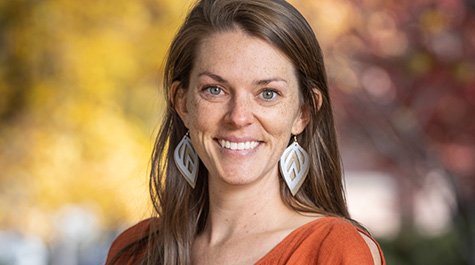Counseling student Lydia Suitt M.Ed. ’23 wins leadership essay contest
Lydia Suitt, a master’s student in the Clinical Mental Health Counseling program, has won first place in the Chi Sigma Iota (CSI) & Council for Accreditation of Counseling and Related Educational Programs (CACREP) Leadership Essay Contest. Her award-winning essay addressed the question: “How is a profession that has evolved for a face-to-face world required to change in a world that is moving towards being digital as a norm?”
Amongst a sea of CSI members’ essays, Suitt’s was chosen for first place by CSI leaders and the CACREP Board of Directors. In her essay, she wrote about how the field must slow down and address the opportunities and challenges presented by providing services via telehealth. She explored telehealth from a lens of equity and access, discussing issues such as the broadband gap, digital illiteracy, insurance coverage and access to confidential spaces. She advocated for interdisciplinary teamwork amongst health providers, coordinated care and creative approaches so that counselors can fulfill their mission of empowering others to accomplish their goals.
“When I saw the topic, I wasn’t sure what I would write, but that changed quickly when I started my research,” says Suitt. “There are so many ways for counselors and other health professionals to promote equity and access in telehealth.”
She will be recognized at the 2022 CSI Delegate Business Meeting and Awards Ceremony in April. Her essay will be published in the CSI Exemplar, the CACREP Connection newsletter, and on the CSI and CACREP websites. She will also receive a one-year membership renewal to CSI and a monetary prize.
Suitt hopes that her essay will inspire collaborative work around equity. “I hope my essay will get people thinking about these issues and ways that they can engage in the work,” she says. “I bring up a number of issues, and almost all of them require collaboration. I hope that those who read it are able to identify some way that they can contribute to promoting equity and access in telehealth.”
